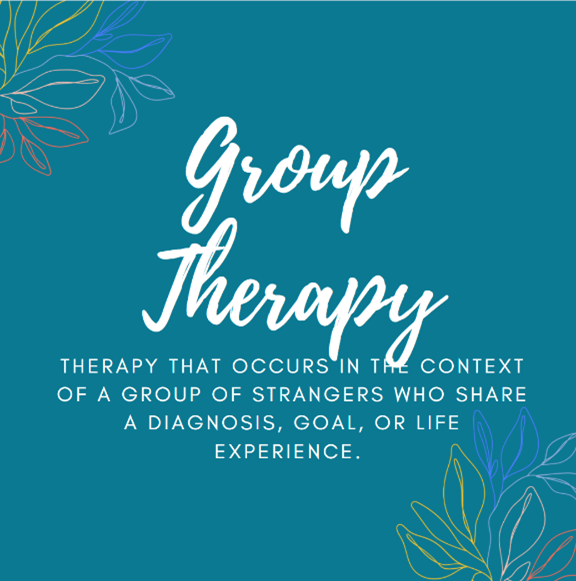
There are few people out there who would say that joining a group is an easy, stress free, and soothing event. If you’re one of them, kudos to you! For the rest of us, joining a group can be a stressful experience requiring an uncomfortable amount of vulnerability. If that’s you – you deserve a round of applause for even opening this blog!
There was a time when the mere thought of a group would have the hairs on the back of my neck stand up and I’d be running the other way. Now, I absolutely love to facilitate them and see the incredible impact they can have! You might find that group therapy is exactly what your treatment plan has been missing.
Since the idea of a group can bring some difficult emotions, I wrote this article to share with you why I love therapy groups and why you might too (okay, if not love, maybe why you’d be glad you tried one):
1) Groups are proof that you’re not alone in this
One of the most common fears and confidence breakers among individuals experiencing mental health or life difficulties is the belief that nobody understands what they are going through. Mental health and trauma particularly are incredibly isolating. When you join a group, you realize that everyone in the group shares some of your experiences, challenges, goals, and/or thinking patterns. It can be an incredibly validating experience.
As a facilitator, one of the reasons why I love running groups is getting to see the same clients who have struggled with the belief that nobody else feels or thinks the way they do, receive validation from a group member. The smile, change in tone, and sense of acceptance when they realize there are others like them is unbeatable! I’m getting chills now just thinking of it. Seriously, I live for these moments.
2) Group challenges our beliefs around safety and trust
I put this one here specifically for trauma survivors – trauma greatly impacts our sense of safety and our ability to trust. Some of the most common experiences are feeling unsafe with others, ashamed to be ourselves, and unable to trust.
 An amazing impact of joining a group is slowly challenging those trauma-based assumptions. Perhaps, you will start to see that there are some settings that are safe and some people you can trust in some ways.
An amazing impact of joining a group is slowly challenging those trauma-based assumptions. Perhaps, you will start to see that there are some settings that are safe and some people you can trust in some ways.
In the psychology world, we call these corrective experiences and having just one starts to increase cognitive flexibility which is good – it means you’re moving towards healing.
3) You learn so much more in a group
Research shows that groups can be more effective than individual therapy. Tthe reason is quite simple – in a group you hear others’ experiences and perspectives – and not just any others, others who survived similar experiences and struggle with similar problems. This holds more weight than hearing it from a therapist or reading it in a book.
4) Groups are efficient
In individual therapy things can take longer because daily events and crises come up that need addressing. There’s no space for this in group therapy so you’re likely to stay on track.
5) Group holds us accountable
There are 24 hours in a day – 168 hours in a week. If you attend a 1-2 hour group, that group accounts for 0.6%-1.2% of your week. That’s barely anything! We spend a greater percent of our week in the bathroom.
This is important because science tells us that the more time we spend practicing a new skill, the more likely the new skill will become a habit. I don’t know about you but if I’m investing my time and finances to make change in my life, I’d want those changes to stick. This means that I’d need to consistently practice what I learn outside of therapy. This is hard to do because habits take time to form. Our commitment increases when we know we have a group to report back to.
6) Groups are cost effective
Group therapy sessions are usually a fraction of the cost of an individual therapy session because you’re splitting the cost of services with other group members. For some people, joining a group could enable access to quality and specialized services that would otherwise not be accessible.
7) Activity scheduling
For those of us who don’t have much going on in our days, group therapy provides structure and a self-care activity. For those of us with overwhelming schedules, this ensures 1-2 hours per week of self-care. In both cases, making time for the group sends a strong message – I’m important enough to devote 1-2 hours weekly and let’s face it, we usually don’t do that.
Also, let’s be real – it’s f.r.e.e.z.i.n.g outside and things are regularly shutting down due to rising covid cases. Group can help you get through some of these difficult months by increasing your sense of connection, giving you activities and skills that can help you through, and getting you ready to leap into spring feeling more confident.
. . .
 So what do you think? Does group therapy sound as bad as it did before?
So what do you think? Does group therapy sound as bad as it did before?
If you’re feeling isolated, want to learn some life skills, and connect with others who share your goals, group just might be exactly what you need!
New Moon Psychotherapy will have various online groups for adults beginning in February and March:
- Loving Someone with PTSD: A support group for parents and partners of individuals experiencing PTSD
- CPT for Sexual Assault Survivors: A Cognitive Processing Therapy group for women survivors of sexual violence
- Seeking Safety: A skills-based group for living with trauma and problematic coping (substance use, self-harm, risky sex, etc.)
- Happy New Year: Harnessing the power of positive thinking based on the Happiness Advantage by Shawn Achor
- CBT for Anxiety: Gain the tools necessary to nix that anxiety just in time for spring
 Interested in learning more about groups at New Moon Psychotherapy? Click here to learn more about each group and to learn about what participating in a group at New Moon Psychotherapy is like.
Interested in learning more about groups at New Moon Psychotherapy? Click here to learn more about each group and to learn about what participating in a group at New Moon Psychotherapy is like.
Considering group but got some unanswered questions or concerns? Reach out to speak to one of the group facilitators – we’re happy to arrange a free 15-minute consultation to answer your questions and address your concerns.
Reach out by email [email protected] or call/text 647-203-3023.


